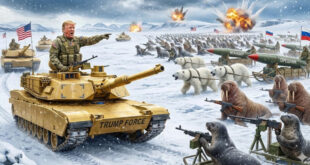 Russian Foreign Minister Sergei Lavrov said he had agreed with U.S. Secretary of State Condoleezza Rice after six hours of talks in Moscow to study further U.S. proposals aimed at allaying Russian concerns about the shield.
Russian Foreign Minister Sergei Lavrov said he had agreed with U.S. Secretary of State Condoleezza Rice after six hours of talks in Moscow to study further U.S. proposals aimed at allaying Russian concerns about the shield.
The U.S. plan has plunged relations between the two countries to a post-Cold War low and negotiations on the proposals have already been running for almost six months.
“On the matter of principle the positions of our two sides have not changed,” Russian Defense Minister Anatoly Serdyukov said after taking part in the talks with Rice, Lavrov and U.S. Defense Secretary Robert Gates.
Time is running out to reach a deal before U.S. President George W. Bush’s administration leaves office in under a year.
The United States says it wants to install radar and missile installations in Poland and the Czech Republic to protect against missile strikes from so-called “rogue” states, specifically Iran.
Russia says a shield would upset the strategic balance and threaten Russia’s own security. It has said it may return to its Cold War posture of targeting its nuclear missiles at Europe if the shield is built.
Briefing reporters after their meeting, Rice and Lavrov appeared upbeat and friendly, passing notes and joking together when a Russian reporter addressed her as “Mrs Gates.” The last such four-way meeting was in Moscow in October.
Rice said they made progress on a so-called strategic framework agreement laying the foundations of U.S.-Russian relations for several years. According to a U.S. official, the document lays out about 20 topics of mutual interest and cooperation split into four subject areas — economics, security, weapons of mass destruction and terrorism.
Another senior U.S. official said one reason for the document was to bring more stability to Russia-U.S. relations.
“There was a dominant theme that things were slipping,” said the official, who spoke on condition of anonymity.
There was no agreement on how to replace the START treaty, a cornerstone arms control pact, when it expires next year. Washington is resisting Russian pressure for a fully-fledged successor treaty.
COLD WAR PARALLELS
Disputes between Moscow and Washington over the missile shield, Kosovo’s independence, the war in Iraq and Russia’s human rights record have prompted some observers to draw parallels with the Cold War.
But economic ties are vibrant. Trade between the two countries increased to $17.5 billion last year, from $15 billion in 2006, and U.S. firms have invested heavily in Russia.
Lavrov’s tone on the missile shield was more conciliatory than at previous meetings – a shift characterized by U.S. officials as progress. Acknowledging that Washington was determined to deploy the shield, he said the talks should focus on mitigating what Moscow sees as the risks from it.
“We have appreciated that while disagreeing with us in substance, they (Washington) agreed that their project fuels our concerns and offered proposals aimed at lifting or easing these concerns,” Lavrov said.
Another senior U.S. official said the Russians appeared to be taking a more “pragmatic, realistic” approach to missile defense as discussions heated up with the Czech Republic and Poland.
Washington’s offer to Moscow includes allowing Russia to inspect the missile shield sites and not activating the system unless there is firm evidence Iran has, or is close to acquiring, a long-range missile strike capability.
The Russian ministers on Tuesday promised to closely examine the measures Washington was offering. Similar promises though were made at October’s meeting, prompting some U.S. officials to ask if Moscow was playing for time.
The Bush administration has less than 10 months left in office and Russia is eyeing what a new U.S. government might do on missile defense and other contentious issues.
“The Russian leadership has two good allies — time and U.S. policy. If the Democrats win the U.S. presidential election, they could review the missile defense program,” Russia’s Vedomosti daily wrote in an editorial on Tuesday.
 Eurasia Press & News
Eurasia Press & News


